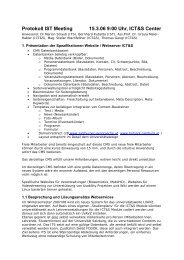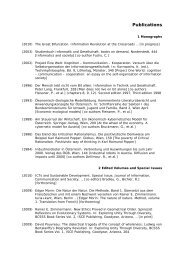CHRISTIAN FUCHS - ICT&S - Universität Salzburg
CHRISTIAN FUCHS - ICT&S - Universität Salzburg
CHRISTIAN FUCHS - ICT&S - Universität Salzburg
You also want an ePaper? Increase the reach of your titles
YUMPU automatically turns print PDFs into web optimized ePapers that Google loves.
Christian Fuchs: Social Networking Sites and the Surveillance Societybehaviour of the students in our sample in respect to studiVZ.9.5. Facebook39.5% of the respondents use Facebook, which is clearly a lower number than in thecase of Facebook (88.3%). 94.0% of the Facebook users in our survey answeredcorrectly that Facebook is allowed to collect and store data on their informationbehaviour. Only 20.4% knew that Facebook is allowed to reuse and resell personaldata. 54.5% knew that advertising clients of Facebook are allowed to gather data on theinformation behaviour of users. Only 33.2% answered correctly that Facebook isalways allowed to send them personalized advertising. By combining the answers tothese four questions, we collected the Facebook knowledge index: 4.7% of theFacebook users had little knowledge about Facebook (no correct answer), 31.5% smallknowledge (one correct answer), 29.8% average knowledge (two correct answers),26.0% good knowledge (three correct answers), and 8.1 a high degree of knowledge(four correct answers). This means that only 34.1% of the Facebook users had a good orhigh degree of knowledge on what Facebook is allowed to do with their data, whereasin the case of studiVZ users the degree of correct answers to such questions was onaverage 88.7% (the average of 91.8% and 85.6%). The knowledge on what platformsare allowed to do with personal data is much higher in the case of studiVZ than in thecase of Facebook. An explanation for this difference can be that studiVZ is morediscussed between friends, more discussed in the media, and had attracted theattention of many users when it changed it terms of use, whereas Facebook is lessknown and less discussed in personal conversations and in the public.68.4% of the Facebook users in our survey have activated social advertisings onFacebook (social ads is a kind of personalized advertising that calculates ads based onfriendship groups). 59.9% have activated Facebook beacon, which collects onsite andoffsite usage data and publishes these on users’ newsfeeds. On studiVZ, on average67.4% of the users in our survey have opted out of advertising options, whereas onFacebook on average only 35.9% of the users opted out of these options. This showsthat critical information behaviour is higher on studiVZ than on Facebook. Anexplanation for this difference is that studiVZ is more known, more widely used, morediscussed in personal conversations and in the public, and has attracted the attention ofusers and the public when it changed its terms of use.68.4% of the Facebook users in our survey have activated social advertisings onFacebook (social ads are a kind of personalized advertising that calculates ads based onfriendship groups). 59.9% have activated Facebook beacon, which collects onsite andoffsite usage data and publishes these on users’ newsfeeds. On studiVZ, on average67.4% of the users in our survey have opted out of advertising options, whereas onFacebook on average only 35.9% of the users opted out of these options. This showsthat critical information behaviour is higher on studiVZ than on Facebook. Anexplanation for this difference is that studiVZ is more known, more widely used, morediscussed in personal conversations and in the public, and has attracted the attention ofusers and the public when it changed its terms of use.Bivariate correlations show that there is a significant positive correlation between thesurveillance critique index and the surveillance knowledge index on the one hand and113









